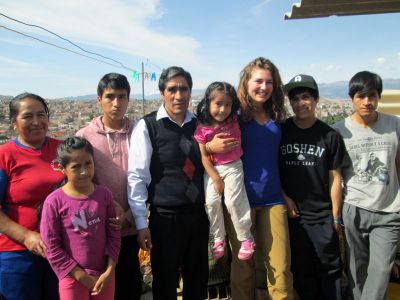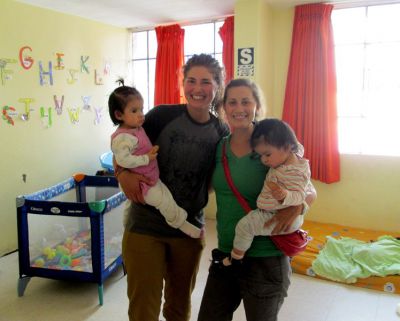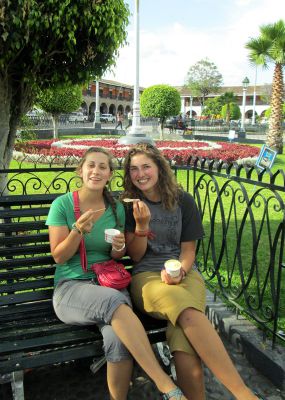On Loving and Leaving Ayacucho
Elizabeth was based in Ayacucho during her six weeks of service, working at two Christian schools and an orphanage. Toward the end of her time there, she wrote this journal entry:

I emailed a friend that I was falling in love with Ayacucho. He responded: “that would mean more if you didn’t fall in love with absolutely everywhere.”
There are worse ways to live.
I am OK that I have fallen in love with the foaming noise of motos; dry leathery heat; sun-baked mongrels that gaze lethargically through celeste eyes; nighttime lights that don’t twinkle but flare; the slippery tang of plataños; the throaty echoes of bored chickens; the crackle of eggs snapping with oil; open-air kitchens hung with wrinkling meat; tripping wires and clothes glaring with suds; orange juice slurped from plastic bags peeled and pressed on the road in blue tin carts . . .
the sugary smell of car exhaust and mountain wind; sitting on the roof of my dad’s church on Sunday afternoons munching on boiled potatoes and fatty pork with greasy fingers; a savannah of flattened rooftops crowded with fabric, bricks and basins to catch rain; scaly talons that curl as the chicken watching TV next to me on the bed lays an egg; the gunshot crack of “fuegos artificiales” that shoot like stars every night.
There are worse ways to live.

I was opposed to the SST cliché of “changing,” and I like to think that I haven’t, that I am still me, but I have grown. I have a better understanding of what makes me happy. Mariah kept a tiny journal of happy things while on service and it was filled with the things that made us happy, things like those previously listed. Happiness is noticing living.
I still feel confused about what I will do with all I have seen, and there were times when I would just mentally freak, often due to situations at Casa Luz, the orphanage where we worked. But, here I would like to quote Snoopy (a quote sent to me by the same aforementioned friend): “My life had no purpose, no direction, no aim, no meaning, and yet I’m happy. I can’t figure it out. What am I doing right?”
I don’t need to meditate, preach or write novels on my experience. I don’t need to figure it out right away. I can be happy with where I have been and what I have done (as Mariah always says, “We can do hard things.”)
SST has cemented in me the longing for travel, discomfort (though, the one comfort I am really looking forward to is having a bathroom with a light because taking out contacts in the dark is a pain) and living out of a backpack. I don’t want to make the lives I shared a story. I want to let them be lives. I love the people I have met and will miss them deeply; it feels cheap trying to turn them into a lesson.
I am excited to go home, which makes me feel a little guilty. I feel weird returning to a place where I have microwaves, constant Internet and hot showers.
Mariah and I got caught in a rainstorm once and our conversation was as follows:
Me: I really want a hot . . .
Mariah: . . . shower
Me: I was going to say boiled potato

Showers are no longer something I even daydream about; they are so far from reality. The past months have shown me I don’t need these things, yet I have them. What do I do with that?
I don’t want to foresee (reverse) culture shock and in such a way bring it upon myself but I will feel strange. I am also apprehensive about the transition that my relationship with Mariah will need to go through. She was my family, my friend, my confidante over service, and I can’t even begin to verbalize the extent to which I respect and trust her. We only know each other in the context of another country where we were together constantly. It will be a change having to put energy into our relationship; on SST it was so simple (never fear though — we wrote a list of ways to remain friends).
I have felt so much here and it is going to linger. I have felt strong love and strong anger, annoyance at not being understood and moments of bliss when I connect with words. I hope I remember all of the mess and the joy and the moments in between, because they were the reality of my time here.
There are worse ways to live.




